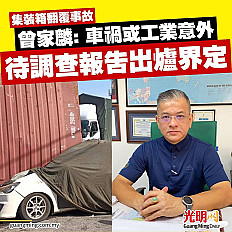Dato’ Chang’s professional opinions via Guang Ming Daily, 16 Nov
16 Nov 2024光明日報 Guang Ming Daily recently interviewed Prof. Dato' Logistician Chang Kah Loon 拿督曾家麟教授, FCILT, FLogM, President of The Society of Logisticians Malaysia (LogM), and Chairman of The Chartered Institute of Logistics and Transport (CILT) (Penang Section), about the tragic container overturning accident that resulted in a fatality. This alarming incident highlights critical concerns in the haulage and road transport supply chain, container handling practices, and potential human negligence, all of which are currently under investigation by the relevant authorities.
As a professional logistician, Dato’ Chang shared precautionary measures to remind everyone involved in consignment handling, including import and export operations, about the importance of safety and diligence:
- Road safety management.
Just want to remind everyone that we're not the only ones on the road. Please take serious precautions before it's too late!
Several precautions can be taken. These measures aim to address both driving behaviour and operational practices in order to enhance safety for all road users.
1. Driver Training and Education
- Ensure all drivers undergo comprehensive training on safe driving practices, including the proper handling of laden containers.
- Provide training on cornering techniques, emphasizing the dangers of speeding and the risks of transporting heavy loads.
- Regularly update drivers on road safety rules, including speed limits and specific requirements for driving with heavy or oversized loads.
2. Vehicle Maintenance and Inspection
- Conduct regular maintenance checks on the trailer and its braking system to ensure the vehicle is in optimal working condition.
- Inspect the container securing mechanisms to ensure the load is properly fastened and secure before every journey.
- Perform routine checks on tires, suspension, and load distribution to reduce the risk of instability, especially when cornering.
3. Speed Control and Monitoring
- Implement and enforce speed limits for drivers, particularly when approaching turns, curves, or high-risk areas (e.g., intersections, pedestrian zones).
- Install GPS tracking systems with real-time speed monitoring to ensure compliance with speed regulations.
- Encourage the use of cruise control in certain conditions to maintain safe speeds.
4. Cornering Safety
- Advise drivers to reduce speed before entering curves or corners, particularly when carrying heavy or unstable loads.
- Install speed reduction devices or signs at sharp corners, indicating caution for heavy vehicles.
- Use onboard cameras or sensors to provide drivers with better visibility and awareness of their surroundings when cornering.
5. Use of Technology
- Implement collision avoidance systems, especially for vehicles carrying heavy containers, to prevent accidents caused by sudden movements or loss of control.
- Equip trucks with automatic braking systems (ABS) that activate during emergency braking or loss of control.
- Install load sensors that can provide feedback to the driver about the stability of the cargo, particularly in turns.
6. Enforce Fatigue Management
- Ensure drivers are well-rested and follow regulated driving hours to avoid fatigue, which can impair reaction times and judgment.
- Provide regular breaks during long-haul trips to allow drivers to rest and stay alert.
7. Clear Road Signage and Road Design
- Advocate for proper road signage and markings to warn drivers of sharp corners or curves, particularly in areas with heavy vehicle traffic.
- Make sure to design road infrastructure, such as corners and intersections, to safely accommodate the movement of larger vehicles.
8. Liability and Accountability
- Hold drivers and fleet operators accountable for the safe operation of their vehicles, including their speed and load management.
- Establish a robust incident reporting system that enables drivers to report unsafe road conditions or truck-related issues immediately.
9. Public Awareness and Engagement
- Promote public awareness campaigns highlighting the dangers of speeding and unsafe cornering, especially around truck-heavy areas.
- Encourage other road users to maintain a safe distance from trucks and containers and to be cautious around large vehicles during cornering.
10. Insurance and Legal Compliance
- Ensure that drivers have adequate insurance coverage for both the vehicle and cargo in the event of an accident.
- Follow all local and international regulations for transporting containers, ensuring compliance with safety standards and best practices.
- Implementing these precautions can significantly reduce the likelihood of similar accidents occurring, ensuring the safety of drivers, passengers, and the public.
- Safety in logistics is a shared responsibility, and proactive measures can prevent such unfortunate events.
- Related article: https://guangming.com.my/%E6%9B%BE%E5%AE%B6%E9%BA%9F-%E8...
For more info: https://www.facebook.com/share/p/1Pd6koUC1S/
For more info: https://www.facebook.com/share/p/1Pd6koUC1S/


